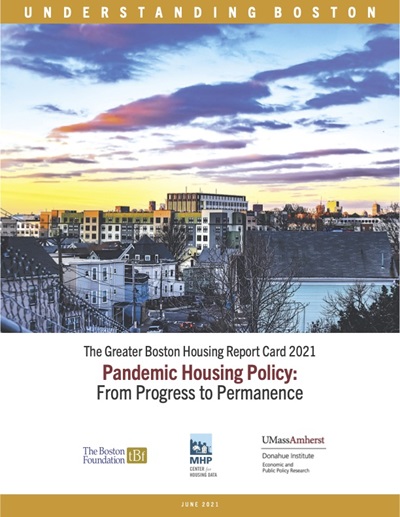The Journey from Pandemic to Permanent Changes in Housing
June 30, 2021
An online forum gathered for the release of the 18th annual Greater Boston Housing Report Card and closed out the Boston Foundation events season on June 30, 2021.
After an introduction from Boston Foundation President and CEO M. Lee Pelton, and words of appreciation and encouragement from Massachusetts Secretary of Housing and Economic Development Mike Kennealy, Mark Melnik, Director of Economic and Public Policy Research at the University of Massachusetts Donahue Institute, presented a brief summation of the findings. It was not just a “report card” on the state of housing production, availability and cost in our region, but an assessment of recent crisis responses with an eye to how they may inform future policy and practices to speed resolution of our longstanding housing woes.
The report focused on three slices of the housing ecosystem pie: Economic inequality and housing cost burden; housing stability; and the housing market. It examined stats over the last year, covering the periods before the pandemic, then trends during the early and late stages of the crisis. The report assessed policy responses and their effectiveness, and offered recommendations for continuing, adapting or adding to those for the long haul.
In the most general terms, for each of those three categories, the researchers recommended that we:
- Expand direct household income assistance and the use of housing vouchers.
- Continue the “block and tackling” work that kept people housed during the crisis such as: disbursing federal funds fast; supporting Rental Assistance for Families in Transition at greater levels; simplifying applications and other processes; looking for upstream interventions to avoid evictions; and developing local rental support efforts.
- Use the momentum of recent zoning reforms to go farther by legalizing small-scale multifamily development in MBTA communities; improving quality and frequency of transit; making local inclusionary zoning more universal and effective; and changing policies to help reduce housing construction costs.
Despite the housing-related challenges that will remain when the pandemic truly ebbs, Melnik concluded on a hopeful note, saying that we have proven ourselves capable of bold action in the face of a crisis: We could and should continue our boldness post-crisis.
In a discussion moderated by the Boston Foundation’s Director of Neighborhoods and Housing, Soni Gupta, three housing advocates shared views from their respective city, state and national perspectives. District 1 Boston City Councilor Lydia Edwards largely agreed with the contents of the report, but pointed out issues that were omitted, such as rent control and stabilization. “Just throwing money into the market to keep people afloat will not bring housing costs down,” she said - which isn’t to say resources aren’t important. All panelists observed that the success of the COVID-era interventions depended on ample funding from local, state and federal sources. “Resources and speed are always the challenges,” said Amy Stitely, Chief of Programs at the Massachusetts Department of Housing and Community Development.
For his part, Rick Jacobus, Principal at Street Level Advisors in California’s Bay Area, appreciated the report’s focus on guaranteed basic income, saying that it isn’t tied to housing often enough. “You can’t really have a housing policy that is only about housing,” he noted. He said he was pessimistic at the start of the pandemic, envisioning a repeat of the 2008 housing crisis where, in the end, the financial institutions got bailed out but families were left hanging. “Was I glad to be wrong!” he said, adding, “I hesitate to be so optimistic, but it seems we may have learned from that.” He hadn’t expected the American people to be so willing to get behind direct financial supports, and that has made a huge difference.
Panelists
Lydia Edwards, District 1 City Councilor, City of Boston
Soni Gupta, Director, Neighborhoods and Housing, The Boston Foundation (Moderator)
Rick Jacobus, Principal, Street Level Advisors
Amy Stitely, Chief of Programs, Massachusetts Department of Housing
and Community Development
Other policies the trio would like to see taken up would establish more pipelines to home ownership, whether through down payment support, land trusts for deed- restricted first-home purchases, sealing of eviction records or other approaches. On the production side, too, there’s much to be done. Rethinking requirements that increase construction costs could make building non-luxury units more attractive to developers. Still, development has to proceed with care, whether market rate or subsidized.
Edwards explained how mitigation against current and past damage should be part of the permitting process. It may be objectively true that more market-rate units will soften the market, but that economic argument is not enough. As Jacobus noted, “People see their neighborhood becoming a neighborhood for someone else. We can’t say, ‘Well, it’s good for the market in general, so too bad about your neighborhood.’ Even if more building helps everyone, it is obviously a racial equity issue if we’re only building in some places”—places that until recently were predominantly Black neighborhoods, for instance. The Bay Area has started taking a geographic equity approach to development. “The politics line up differently when you frame it that way. We need to share some of the burden of change so it isn’t all on community of color neighborhoods.”
Given the passion of the panelists and the nearly 200 people tuning in, Lee Pelton’s introductory words ring true: “We are in many ways at a perfect time and place to make dramatic changes in housing policy”—an effort Secretary Kennealy called “the ultimate team sport.” It will require the work of advocates, policymakers, developers, funders and others to stay on track. Pelton said, “One thing we know is clear: The opportunity is at our doorstep and we have the choice to seize it.”

